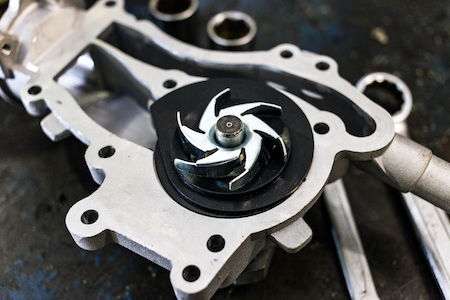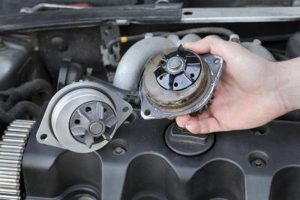Water sustains everything on earth, and your car is no exception.
Your vehicle was built with a water pump that is a vital part of the cooling system. When running, it continually circulates coolant from the radiator to the engine block to prevent overheating.
How a water pump works
If you’ve ever popped the hood of your car to perform basic maintenance, it probably comes as no surprise that your vehicle stores a lot of heat while in operation. It takes a lot of action to keep your car operating correctly, especially when you can reach speeds of fifty miles per hour and greater, even just running to the grocery store.
Thanks to modern technology, and manufacturers that are constantly looking for ways to improve their processes, today’s vehicles are made for durability and longevity. While cars built decades before were expected to last around 100,000 miles, today’s cars can double or triple that. That’s good news for the consumer. But it also means that you need to be even more diligent in regular maintenance to keep it working at its best.
A car under constant pressure can only withstand so much before individual components begin to wear down. Excessively high temperatures underneath the hood regularly can damage parts over time.
The water pump is designed to push coolant through the engine block and radiator through a series of hoses. Without this coolant, the engine block could quickly overheat, causing damage that can require extensive repairs.
 The water pump is a part of a series of systems that ensure your vehicle runs at optimal performance. When a car starts, the serpentine belt also begins to move. This belt allows the impeller blades inside the water pump to turn, pushing coolant to the various places in the system, including the cylinders built around the engine.
The water pump is a part of a series of systems that ensure your vehicle runs at optimal performance. When a car starts, the serpentine belt also begins to move. This belt allows the impeller blades inside the water pump to turn, pushing coolant to the various places in the system, including the cylinders built around the engine.
Hoses take the coolant into the radiator. As it moves through the system, it travels across the radiator fins to help the liquid cool down. It breaks down the heat formed during operation, keeping the engine compartment cool and running well. Then it continues on its journey back towards the water pump. This cycle continues as long as you drive your car.
This process wouldn’t be possible without the water pump. It maintains the flow of coolant throughout the system for as long as your car is in operation. While it may seem like a simplistic part, it’s vital to the operation of your vehicle.
When a water pump stops working
A water pump isn’t something you’ll have to replace often. In most cars, the water pump is expected to last 60,000 to 90,000 miles. The water pump is usually located behind the timing belt, and the two are often changed out at the same time.
Age is one factor that could lead you to suspect a problem with your water pump. The older your car is, the greater the chance maintenance issues will arise with your vehicle. This is why regular check-ups help you stay ahead of potential problems, and ensure your vehicle stays working at its best.
Water pumps do give off warning signs that something is wrong.
Leaking fluids
A water pump has several seals and gaskets to help it operate correctly, maintaining the flow of coolant throughout the system. Each of these seals and gaskets are important to keep coolant in the system, and avoid it spilling out and all over the roads. If they start to fail, small puddles may form underneath your car when it’s parked. Be on the lookout for what happens underneath your car, especially if you park in the same spot over and over again.
Coolant is either orange or green in color, depending on the type. If you notice it pooling and it takes on a rusty color, that indicates the rust inhibitor has broken down and it no longer controls rust and scale buildup. You might also notice a buildup of gunk on the pump itself, which has the potential to rust the various components.
High pitched whine
Over time, you start to develop a sense of how your car sounds as it operates. Any time noise strays from the normal, question it and bring it in for a check-up to find out what is making the noise.
With water pumps, the serpentine belt and pulley system that keeps the fluid running can sometimes start to whine. This is especially prevalent as you’re accelerating. You may also notice a grinding or growling noise, which can be an indicator of bad bearings in the system. While a mechanic may be able to fix the noise by adjusting the belt or tweaking the bearings, ultimately, it’s because components are wearing down and are in need of replacing.
Overheated engine
An overheated engine is a sign of major malfunction, and could be a costly repair. It’s something to avoid at all costs. Still, it can happen. Pay attention to the temperature gauge. If it shows your engine is running hot, you should have a mechanic take a look and locate the problem.
Steam from the radiator
Another sign of overheating is if you see steam coming out of the engine compartment. If steam comes up from underneath the hood, pull over safely, and turn off your vehicle. Call in a tow truck and bring it in to have one of our mechanics look at it and determine where the problem lies. If you keep driving it, it will cause more damage. Instead of replacing the water pump, for example, you may be replacing the entire engine.
What’s involved in a water pump replacement?
Replacing the water pump isn’t an every day job. How difficult it is depends on the make and model of your vehicle. Depending on the design, the water pump may be hidden under other components that require special tools to get in and replace it. It often makes sense to replace it with other parts, such as your timing belt.
Finding a trustworthy mechanic who can help you maintain your vehicle for as long as you own it can put your mind at ease.

 Let’s talk water pumps for vehicles here in Denver. The engine in your vehicle is cooled by coolant/antifreeze mixed with water. This mixture circulates around the engine, absorbing some of the heat. The coolant then flows through the radiator where air cools it down for the return trip back through the engine. Your vehicle’s water pump is what drives this process.
Let’s talk water pumps for vehicles here in Denver. The engine in your vehicle is cooled by coolant/antifreeze mixed with water. This mixture circulates around the engine, absorbing some of the heat. The coolant then flows through the radiator where air cools it down for the return trip back through the engine. Your vehicle’s water pump is what drives this process.